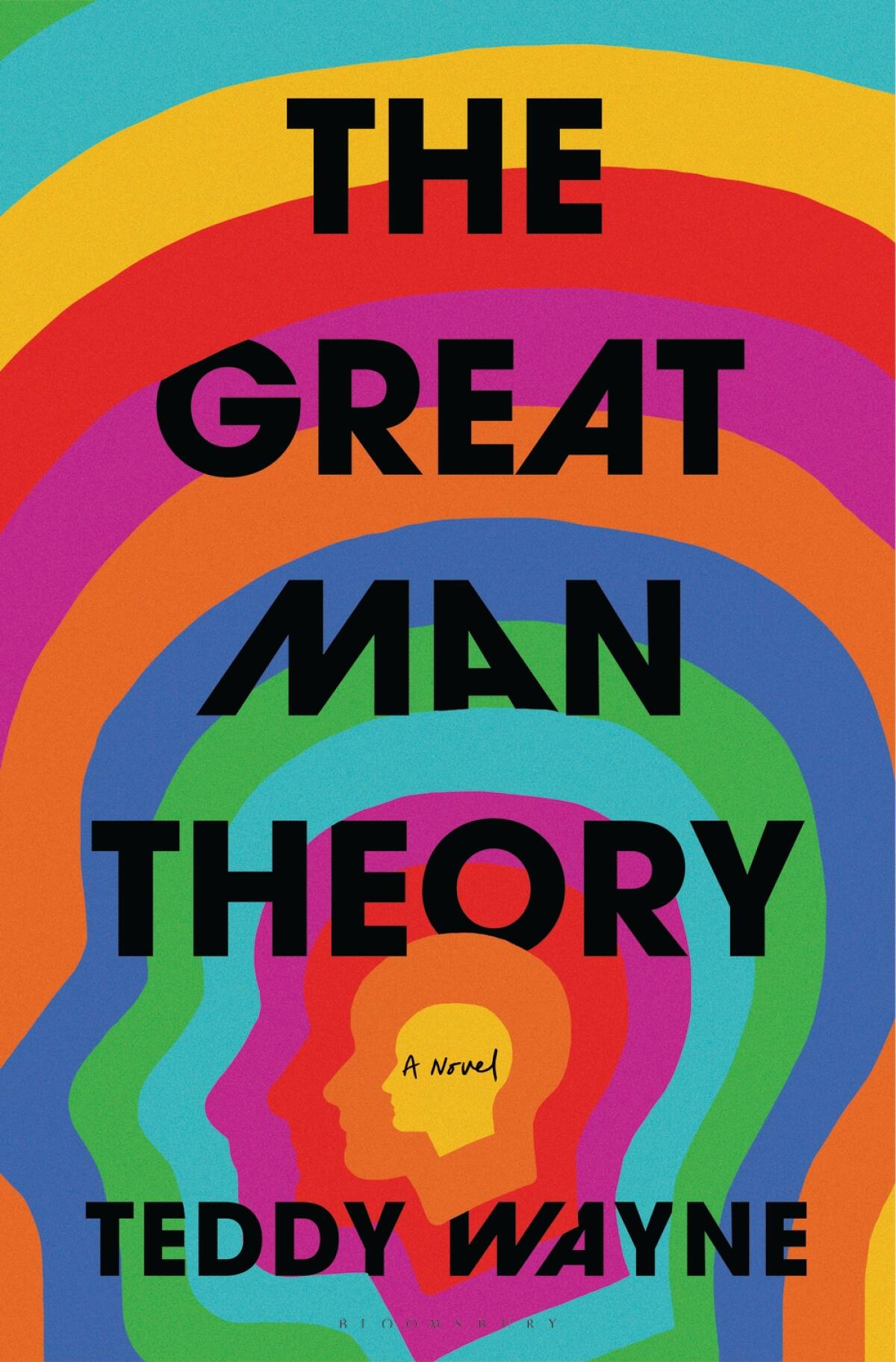Where did it all go wrong for Generation X? Teddy Wayne’s new novel breaks it down

- Share via
On the Shelf
The Great Man Theory
By Teddy Wayne
Bloomsbury, 320 pages, $27
If you buy books linked on our site, The Times may earn a commission from Bookshop.org, whose fees support independent bookstores.
Where did it all go wrong for Generation X? A cohort of principled slackers spent their 20s raining righteous contempt on boomer sellouts and corporate facelessness. Now all they have to show for themselves is grad-school debt and Ted Cruz. A well-honed sense of irony, it turns out, doesn’t offer much of a firewall against older generations’ love of alternative facts and younger generations’ extremely online narcissism.
If that sounds like oversimplifying things, then you’re starting to understand the inner life of Paul, the 42-year-old would-be hero of Teddy Wayne’s fifth novel, “The Great Man Theory.” As the novel opens, he’s a man of convictions, but the beams shoring them up have begun to rot through. He teaches writing at a New York college, but budget cuts have doomed him to adjunct status. The deeply researched, carefully written lit-mag essays on which he made his (modest) name now make him seem out of touch. He’s a divorced dad who can’t even put together a successful party for his 11-year-old daughter — partly because he has to host it at his elderly mother’s home, where he’s moved in to save money.
“Great Man” is often a sharp, funny novel, its punchline being Paul, the middle-aged mediocrity: He’s sliding into crankery, writing a book called “The Luddite Manifesto,” and is prone to interior monologues marked by a sense of superiority and pompous elocution. (He recalls his newborn daughter as “a wizened homunculus of a stranger who was about to upend his heretofore streamlined life.”)
The author talks about “necessary idealism” and his fourth novel, “Apartment.”
But Wayne doesn’t want us to mock him too much. Paul, for all his foibles, is fundamentally decent and committed to clear thinking. He’s understandably troubled by his mother’s newfound love of a right-wing cable news network (you know the one) and its most popular evening host, Colin Mackey (but you know who), a fire-breathing booster of the unnamed populist president (yes, him). Paul is also a victim of circumstance; his options in academia have rapidly vaporized due to forces beyond his control. He’s not wrong to say he’s worked hard while more successful writers deliver “typo-stained, punctuation-free sentences composed from ready-made language that bred ready-made thoughts.” Can you blame him for being upset?
To answer that question, Wayne thrusts Paul into a complex and fairly preposterous plot. Forced to drive a ride-share to make ends meet, he gives a ride to Lauren, a producer on Mackey’s network. A courtship ensues, which Paul hopes to parlay into some airtime on Mackey’s show. If he can pretend to be a deregulation-thirsty free-marketeer convincingly enough to get booked, Paul figures, “he’d speak elevated, cogent truth to power against Mackey, the network, and the president.”

Paul isn’t an idiot: He recognizes that such a rant would get attention for roughly five minutes, even if his mic wasn’t instantly cut off. One man’s elevated, cogent truth is another man’s liberal tears. But bitterness, combined with heavy doses of Adderall, has curdled his clear-eyed realism into identity-warping despair. In that regard, “The Great Man Theory” is a kind of update of Kurt Vonnegut’s 1962 novel, “Mother Night,” in which a man pretending to be a Nazi propagandist winds up becoming the real thing. As Paul grows more radicalized, the warning of Wayne’s novel echoes the signature line of Vonnegut’s: “We are what we pretend to be, so we must be careful what we pretend to be.”
Wayne is an inheritor, too, of Vonnegut’s style — winkingly funny, brisk, broadly satirical. (Though Vonnegut has fallen out of favor in recent years, there’s a cohort of Gen X writers indebted to him, including Gary Shteyngart, Ron Currie Jr., Taffy Brodesser-Akner and Jess Walter.) And like Vonnegut, Wayne is concerned with nefarious authority figures and classist injustices. His oeuvre is filled with characters sick with status anxiety, from aspiring authors (2020’s “Apartment”) to pop stars (2013’s “The Love Song of Jonny Valentine”) to Harvard students (2016’s “Loner”). He’s built his career on pinpointing the social forces that undermine the thoughtful novelist; he will never, ever run out of material.
Dan Ozzi’s ‘Sellout: The Major-Label Feeding Frenzy That Swept Punk, Emo, and Hardcore’ tracks the fortunes of Jawbreaker, Jimmy Eat World and others.
Wayne’s challenge is to expose this dynamic without sounding embittered about it — to reveal Paul’s character without coming off as insufferable as Paul himself. Mission accomplished, though at a cost: He has Paul behave so absurdly over-the-top that the nuanced satire of the early pages becomes more farcical toward the climax. And for a novel featuring a hero nobly fighting a war against cliché, some well-worn tropes slip through. Paul’s classes, full of cow-eyed near-illiterates, are redeemed by one promising female student. His over-earnest efforts to encourage her backfire just as you’d expect them to.
In the process, however, Wayne does hit on an important idea about our radicalized environment. Paul’s tragic error isn’t just that he blames everybody but himself. It’s that he’s mistaken his threadbare, comforting routines for bedrock principles. Certain of the one path of good writing he learned in college, he persuades himself that “he was a lone dam against a tidal wave of pass-the-buck education.” Certain of his preferred modes of communication, he rejects all the rest. Sure of his method of proper parenting, he winds up being bad at even that.
“The Great Man Theory” takes its title from the 19th century Scottish writer Thomas Carlyle, whom Mackey quotes in defense of President You-Know-Who: “The history of what man has accomplished in this world is at bottom the history of the great men who have worked here.” Well-intentioned bookish types are as susceptible to this line of thinking as populist blowhards, Wayne means to say; anybody who feels threatened likes to turn themselves into the hero of their own story. As dangers to society go, men like Paul hardly seem to register. But Wayne wants to get well-intentioned bookish types — people who read novels — to look in the mirror. For them, elevated, cogent truth just might work.
A guide to the literary geography of Los Angeles: A comprehensive bookstore map, writers’ meetups, place histories, an author survey, essays and more.
Athitakis is a writer in Phoenix and author of “The New Midwest.”
More to Read
Sign up for our Book Club newsletter
Get the latest news, events and more from the Los Angeles Times Book Club, and help us get L.A. reading and talking.
You may occasionally receive promotional content from the Los Angeles Times.











